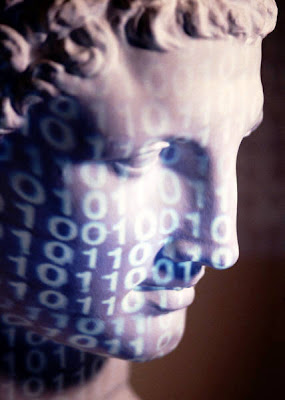“If it can be destroyed by the truth, it deserves to be destroyed by the truth.” Carl Sagan
Free expression is desirable until someone gets offended, but the essence of free speech is that being offended shouldn't be a barrier to speech, because this is a sure way to kill true dialogue, debate, and, yes, revision. Primitive, traditional, conservative societies have the greatest penalties (social and legal) against the new, the different and progressive. Most people in history and all societies until very recently--and this is not universal even in the 21st century--have been conservative.
 |
| If only the cartoonists applied their magical powers wisely... |
I think most, not all, people conform to their surroundings. In evolutionary terms, this is an advantage. Adapt or perish. Yet, this is not quite obvious, or the advantages of change may not be easily understood. "If it ain't broke, don't fix it," is true but limits innovation and change. Not all change is good, and there are risks, however, we wouldn't have the advances we enjoy today if we stuck to the old ways.
I've talked about this several times before and it's one my favorite lectures in my politics classes: Being progressive or conservative can be described as a disposition. It's the first "gut reaction" people have to a new idea or a new situation. Of course, there can be a mixture of attitudes as many people have a variety of strong opinions about important issues. The fundamental attitude though is very strong.
Social and political change does happen. Why? And, who initiates it? Historically, it's been leadership that has moved the masses. Religious, political, economic leaders have shaped public opinion, morality, and behavior. In a democracy elected leaders reflect the public sentiment and they act as delegates. They should also act as trustees--in the interest of the country, which on occasion may not be what the people want to hear. Good leaders are those who take the country in a progressive direction, whereas the lives of the common people improve.
Fighting slavery and for civil rights hasn't been popular always; same with defending free expression that may be to the dislike of the majority. But, such a progressive approach makes for a better society--a society whose values now include many of the things were thought as radical, offensive, dangerous.
Modernity presents many challenges to authoritarian/totalitarian regimes, since technology gives people options to access to information and the outside world. Comparing conditions and realizing that liberal democracies have many advantages, indeed offer better life conditions than closed societies, is an eye-opener. It does take time to truly transform a society since culture (including religion) and the people's sense of identity are very strong, especially among people who aren't very cosmopolitan and educated.
Regimes that maintain (or try to) an iron fist over their people are limiting access to information & technology. It's a losing battle, in my opinion, though many people will suffer as those regimes eventually wither. Now, here's a big question: when will those non-democratic regimes wither? Similarly, is liberal democracy the ultimate destination? I think the answer depends on the existing conditions.
Competition for limited resources, strife of all kinds, danger, sickness, lack of education, are the root causes of making a culture/society that is not open, less charitable, less secure, and more afraid. All this is not a good foundation for liberal democracy. I also think that liberal democracy evolves over a long time. This type of a regime isn't the same as democracy--where people decide by majority, but who may also not be tolerant of the "other" and of minorities.
In the 1990s, people got arrested for producing or selling rap music to adults. In times of crisis, questioning the government, or the majority's group-think can still get people in trouble. Some states want to prohibit abortion, even access to birth control. As an adult, who should be in charge of your own body? Should you be able to use it anyway you want? Without harming others, of course. Should you have the power to check out (die) on your own terms? Should you have the right to hallucinate by means other than religion?
Barbarism Thrives in Saudi Arabia
Here's a country that in the name of religion remains barbaric if we judge it by the policies and practices of its government. It's the antithesis of liberal democracy, but it's also an international pariah in terms of harsh treatment of minorities, women, homosexuals, political dissenters, and those who practice ..witchcraft.Raif Badawi has been arrested and convicted to seven years in prison, a hefty fine, and 1,000 "severe lashes" for promoting liberalism. His web site, Free Saudi Liberals, is considered treacherous, insulting, and threatening to a society of the Dark Ages. The sham Saudi supreme court just upheld his conviction and now it's up to the new (old bag) king, if he wishes, to pardon or alleviate this sentence. Saudi Arabia should be reminded, every time and everywhere, how barbaric it is. [Here's the NYT editorial on the Badawi case]














